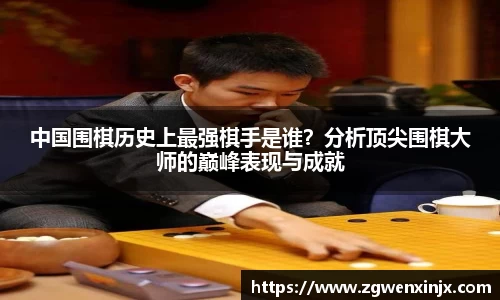中国围棋历史上最强棋手是谁?分析顶尖围棋大师的巅峰表现与成就
中国围棋作为一项具有悠久历史和深厚文化底蕴的传统智力竞技运动,吸引了无数顶尖棋手的参与。在众多围棋高手中,谁才是中国围棋历史上最强的棋手?这是一个备受争议的话题。本文将从多个角度深入分析这一问题,探讨中国围棋史上顶尖棋手的巅峰表现与成就,重点分析了围棋历史上几位最具代表性的棋手,他们在围棋领域的杰出成就和影响力。首先,我们将从历史地位、技术水平、影响力和对围棋发展的贡献四个方面展开讨论。通过这些分析,本文不仅展示了这些棋手在巅峰时期的表现,也帮助我们更好地理解了围棋这项传统文化中的智慧与深度。
1、历史地位:巅峰棋手的时代背景
中国围棋历史悠久,从古代的“弈”到现代围棋的职业化,经过了漫长的发展过程。在围棋史上,几代棋手的崛起都与时代背景密切相关。历史上最强棋手的出现通常伴随着围棋水平的整体提升与对围棋认知的深化。尤其是20世纪末和21世纪初,随着围棋职业化的推进,中国涌现了多位世界级的顶尖棋手,这一时期的棋手不仅仅具备卓越的棋艺,更能够代表中国围棋的水平与风采。
在这个时代背景下,柯洁、聂卫平等棋手在国内外赛场上的表现使得中国围棋逐渐成为世界围棋的主导力量。聂卫平曾一度被誉为“围棋皇帝”,他的多次世界冠军头衔以及对围棋事业的贡献,使得他在中国围棋历史中占有重要地位。而柯洁的崛起,尤其是在战胜李世石、朴廷桓等一流棋手后,他的地位更是得到了国际围棋界的认可。柯洁代表了现代围棋的快速发展,尤其是他的人工智能挑战和围棋思维的独立性,更将中国围棋推向了全球巅峰。

通过这些杰出的棋手,围棋的历史地位在中国不断提升,特别是在进入21世纪后,中国围棋的国际影响力逐渐与日俱增。随着各项赛事的举办和围棋文化的传播,中国围棋已经不再仅仅是国内的象征,更是世界围棋竞技的重镇。
2、技术水平:绝顶棋艺的展现
围棋是一项复杂且深邃的智力竞技运动,对于棋手的技术要求极高。无论是开局布局的选择、形势判断,还是后期的精确计算和巧妙战术,都需要棋手具备非凡的洞察力和极高的计算能力。中国围棋历史上最强棋手的技术水平,往往表现为对每一个细节的精准把控,以及在复杂局面下展现出的超凡能力。
以聂卫平为例,他的围棋技巧在中国围棋史上具有划时代的意义。聂卫平以其深厚的围棋功底、灵活多变的战术和丰富的比赛经验赢得了众多国际比赛的冠军。他不仅在布局上具有很强的创新能力,在实战中对局势的掌控力也几乎无可挑剔。聂卫平的技术特点在于他能够以极其精巧的手段控制局面,巧妙的攻防转换让对手无法捉摸。
在现代围棋领域,柯洁代表了更为先进的技术水平。柯洁在技术上的超凡表现,尤其是在与人工智能的对局中展现出的独特策略,使得他成为了世界级的棋手。柯洁的计算能力、布局理解力以及局部战斗的能力堪称一流,他的局面判断和技术处理在多个世界级比赛中展现得淋漓尽致。通过与世界顶级棋手的对抗,柯洁的技术水准不断突破极限,成为现代围棋的新标杆。
技术水平的提升离不开对围棋的深入理解。中国围棋历史上的顶尖棋手能够在局势变化中应变自如,凭借扎实的技术功底和深邃的棋理理解,始终站在世界围棋的巅峰。
3、影响力:推动围棋文化的全球化
中国围棋历史上最强棋手的影响力,不仅体现在他们在赛场上的胜利,更体现在他们对于围棋文化的推广和普及上。顶尖棋手的影响力能够吸引更多人关注围棋,提升整个围棋运动的全球认知度。尤其是在中国围棋走向国际的过程中,这些棋手的作用尤为重要。
聂卫平作为中国围棋历史上最有影响力的棋手之一,他在80年代的辉煌成就不仅为中国围棋赢得了国际声誉,也奠定了中国围棋在世界上的地位。聂卫平带领中国围棋队多次获得世界大赛的冠军,他的个人魅力和精湛棋艺吸引了大量围棋爱好者,也使得围棋成为了中国一项具有广泛民众基础的运动。
进入21世纪后,柯洁成为了新的围棋偶像。除了在棋盘上的不败神话,柯洁还通过参与人工智能围棋比赛以及不断挑战世界顶级高手,提升了中国围棋在全球的影响力。柯洁与李世石的对局,尤其是在人工智能AlphaGo挑战赛中的精彩表现,让围棋重新吸引了全球的目光。柯洁不仅是中国围棋的代表,更是全球围棋的象征。
顶尖棋手的影响力还表现在他们的培养作用。许多年轻棋手通过观看这些大师级人物的对局,获得了启示和动力,这对于围棋的传承和发展起到了积极作用。随着围棋文化的不断传播,越来越多的外国棋手也开始进入中国围棋的训练体系,围棋的全球化进程得到了极大推动。
4、贡献与传承:围棋发展的推动者
中国围棋历史上最强棋手的贡献,不仅限于个人的竞技成就,他们更是推动围棋发展和传承的关键人物。从技术到文化,从赛事的组织到人才的培养,顶尖棋手在推动围棋发展方面做出了巨大的努力。
聂卫平无疑是中国围棋历史上最具代表性的贡献者之一。在他的带领下,中国围棋从上世纪80年代起逐渐崭露头角,尤其是通过他对外界赛事的参与和贡献,聂卫平将中国围棋推向了国际舞台。此外,聂卫平也是围棋普及和教学的先驱者,他开设围棋学校、举办围棋讲座,为围棋的后备人才培养做出了巨大贡献。
柯洁作为现代围棋的代表性人物,也在围棋发展和传承方面作出了突出贡献。柯洁不仅仅在棋场上创造辉煌,他通过社交媒体、围棋直播等方式,让更多的年轻人了解和热爱围棋。柯洁还通过与世界顶尖人工智能的对局,推动了围棋领域的科技发展,并且通过自身的影响力,吸引了大量年轻棋手参与到围棋这一古老的竞技项目中。
这些顶尖棋手的贡献和努力,不仅提升了中国围棋的竞技水平,还极大地促进了围棋文化的全球传播。围棋作为中国传统文化的重要组成部分,在他们的推动下焕发出了新的生机,成为了世界范围内备受推崇的智力竞技运动。
总结:
中国围棋历史上最强棋手的评判标准是多方面的。在历史

发表评论